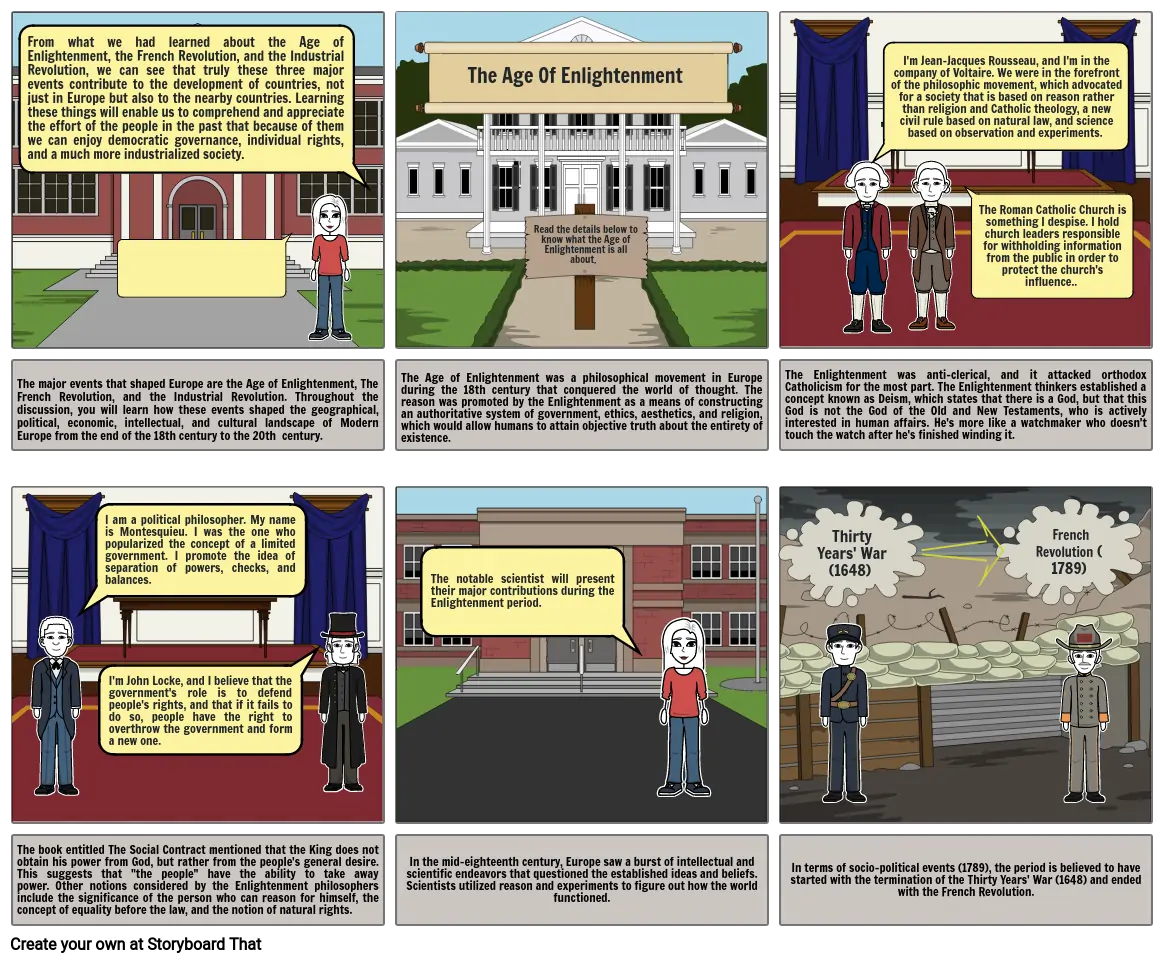Unknown Story

Storyboard Text
- From what we had learned about the Age of Enlightenment, the French Revolution, and the Industrial Revolution, we can see that truly these three major events contribute to the development of countries, not just in Europe but also to the nearby countries. Learning these things will enable us to comprehend and appreciate the effort of the people in the past that because of them we can enjoy democratic governance, individual rights, and a much more industrialized society.
- This is the end of this storyboard. I hope you find this storyboard interesting. Thank You!
- The Age Of Enlightenment
- Read the details below to know what the Age of Enlightenment is all about.
- I'm Jean-Jacques Rousseau, and I'm in the company of Voltaire. We were in the forefront of the philosophic movement, which advocated for a society that is based on reason rather than religion and Catholic theology, a new civil rule based on natural law, and science based on observation and experiments.
- The Roman Catholic Church is something I despise. I hold church leaders responsible for withholding information from the public in order to protect the church's influence..
- The major events that shaped Europe are the Age of Enlightenment, The French Revolution, and the Industrial Revolution. Throughout the discussion, you will learn how these events shaped the geographical, political, economic, intellectual, and cultural landscape of Modern Europe from the end of the 18th century to the 20th century.
- I am a political philosopher. My name is Montesquieu. I was the one who popularized the concept of a limited government. I promote the idea of separation of powers, checks, and balances.
- The Age of Enlightenment was a philosophical movement in Europe during the 18th century that conquered the world of thought. The reason was promoted by the Enlightenment as a means of constructing an authoritative system of government, ethics, aesthetics, and religion, which would allow humans to attain objective truth about the entirety of existence.
- The notable scientist will present their major contributions during the Enlightenment period.
- Thirty Years' War (1648)
- The Enlightenment was anti-clerical, and it attacked orthodox Catholicism for the most part. The Enlightenment thinkers established a concept known as Deism, which states that there is a God, but that this God is not the God of the Old and New Testaments, who is actively interested in human affairs. He's more like a watchmaker who doesn't touch the watch after he's finished winding it.
- French Revolution (1789)
- The book entitled The Social Contract mentioned that the King does not obtain his power from God, but rather from the people's general desire. This suggests that "the people" have the ability to take away power. Other notions considered by the Enlightenment philosophers include the significance of the person who can reason for himself, the concept of equality before the law, and the notion of natural rights.
- I'm John Locke, and I believe that the government's role is to defend people's rights, and that if it fails to do so, people have the right to overthrow the government and form a new one.
- In the mid-eighteenth century, Europe saw a burst of intellectual and scientific endeavors that questioned the established ideas and beliefs. Scientists utilized reason and experiments to figure out how the world functioned.
- In terms of socio-political events (1789), the period is believed to have started with the termination of the Thirty Years' War (1648) and ended with the French Revolution.
Över 30 miljoner storyboards skapade

